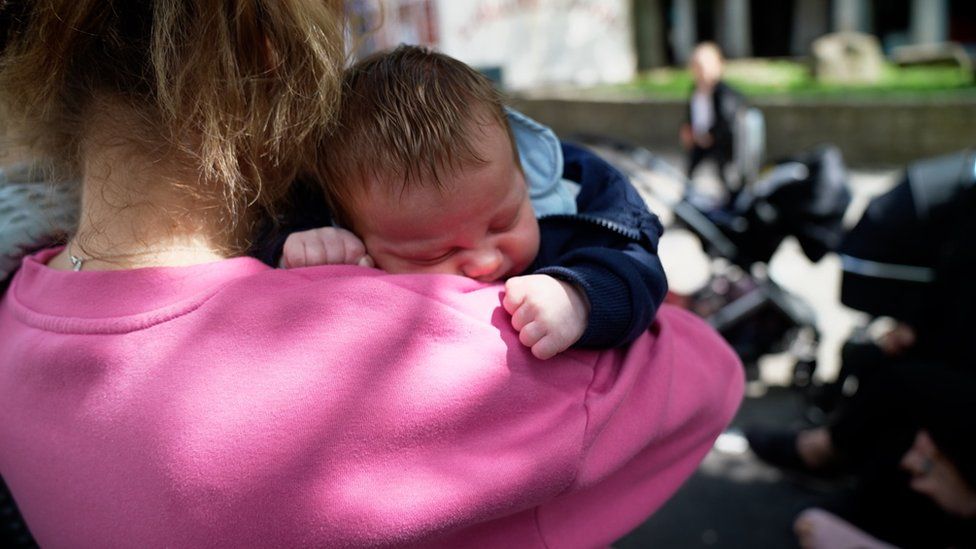
By Michael Buchanan and Judith Burns
BBC News
The number of people living in temporary accommodation in England has hit a 25-year high, according to the latest official figures.
Almost 105,000 households were in temporary accommodation, including more than 131,000 children, on 31 March this year.
This figure is 10% up on the same day last year, the Department for Levelling Up, Housing and Communities data shows.
In Plymouth, one mum told BBC News of cramped conditions living in a hotel.
This latest figure for temporary accommodation surpasses a previous high of 101,300 reached in 2004, and is the highest since records began in 1998.
The figures also show almost 14,000 households were in hotels or bed and breakfasts in the three months to March.
System ‘broken’
Sitting outside a hotel in Plymouth earlier this month, we found several homeless families keeping each other company.
The busiest was Chantelle Walton, tending to her two children.
Jack is just five weeks old and has only ever known the one hotel room that he shares with his parents and 17-month-old sister, Lily.
Chantelle and her family were made homeless four months ago in a no-fault eviction
Chantelle says the family were made homeless four months ago after being served with a Section 21 notice, or no-fault eviction.
“Its very difficult,” says the 21-year-old. “He wakes up crying for a bottle and wakes her up, and she thinks it’s morning and gets up.”
Their room has a small fridge and a microwave, “so we can sterilise his bottles”. The lack of any decent cooking facilities means – like the dozens of other families in the hotel – they often have to eat out.
Even though her partner works full-time as an engineer, their age, says Chantelle, is working against them: “Because we’re so young, no-one will take you on without a guarantor, and we don’t have a guarantor.”
There are currently more than 200 families living in hotels and bed and breakfasts in Plymouth, and the local council estimates it will spend £6.8m supporting them this year, about 10 times more than five years ago.
“The whole system’s broken,” says Chris Penberthy, the lead member for housing.
“We don’t have enough affordable housing for people who need it. So our waiting list has gone from 8,000 to 12,500 in the last three years.
“That means that when people are in temporary accommodation, there’s nowhere for them to move to, which means that there’s nowhere for people in bed and breakfast to move to.”
Soaring rents
The figures also show a sharp rise in homelessness in older people, in the year to 31 March, with a 33.3% increase in the number of homeless households with a priority need due to old age.
At the root of the problem, say campaigners, is a lack of housing, exacerbated by a decision by ministers to freeze local housing allowance rates for the past three years.
Amid soaring rents, that choice has left much of the country unaffordable for any household needing housing benefit to help pay their rent, while in many areas, landlords are leaving the sector.
Dorothy Dawson has been renting out her home in Devon for 16 years but recently agreed to sell the property, blaming government plans to ban no-fault evictions in England and rising costs.
“My buy-to-let mortgage is going to triple. The council tax between tenants has gone up, the standing charges on the utilities have gone up. It’s not worth it,” she says.








